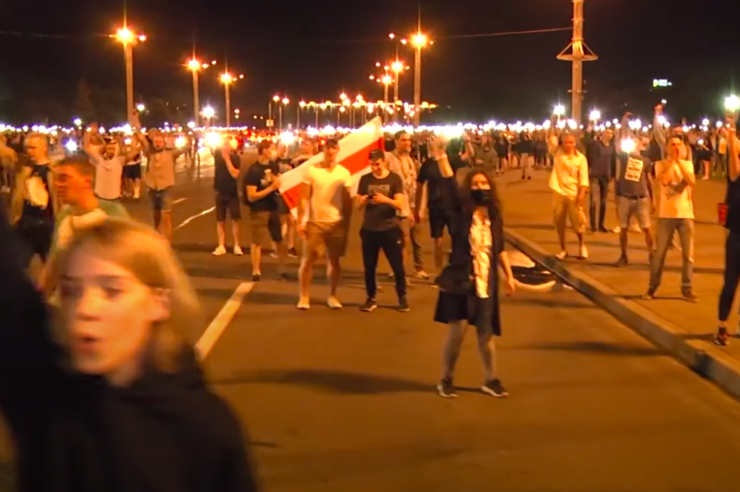
The Belarus presidential election ended with mass protests and a nationwide internet outage.
The country went offline on Sunday during its presidential election. Major social networks and message sites including Viber, Telegram, Facebook, Twitter and Instagram were inaccessible, as were local news outlets.
Following weeks of tension, people streamed into the streets of the capital to protest the landslide victory by Belarus President Alexander Lukashenko, who has been in power for 26 years. Opposition candidate Svetlana Tikhanovskaya rejected the results, claiming they were falsified.
Internet watchdog NetBlocks first detected network disruptions as early as 3:00 a.m. local time on election day, according to NetBlocks CEO Alp Toker and director of research Isik Mater. Social media restrictions began to pick up around 9:00 a.m. local time. But just as the polls were closing on Sunday, at around 8:19 p.m. local time, NetBlocks observed a near total connectivity drop across the country.
Toker exclusively told CoinDesk there were indications three Belarusian banks were reconnected simultaneously at around 1:30 p.m. local time Monday, but the core disruptions that began after the election were still in place.
As of 9:00 p.m. local time on Monday, many Internet blockages remained. “Only Telegram is working now via some proxy servers; those get cut from time to time, too,” said Nadia Venzhina of the Cyber Academy educational project in Belarus. “Those who set up a [virtual private network] in advance still can use Facebook and YouTube, but all the commonly used VPNs are down now, and you can’t install them,” she added.
Thirty human rights organizations signed a petition to the United Nations against the internet outage Monday, including Russia’s Moscow Helsinki Group, the U.K.’s Article19, South African Legal Resources Center and others.
According to NetBlocks’ reports, in 2020 alone at least 10 countries including Zimbabwe and Venezuela at some point resorted to blocking access or use of the internet and social media to suppress communication during elections, or as a means of curbing public protests.
System overwhelmed
On Saturday, a local news report claimed a cellular company confirmed all forms of communication in Minsk, including telephone lines and the internet, would not work on election day. According to the report, employees of hotels and retail outlets received an “unspoken warning” about the communications shutdown but were asked to show up to work.
According to the chief technology officer of the Belarussian hosting service Hoster.by, Denis Otvalko, the reason for the outage might be the deep packet inspection (DPI) software analyzing web traffic to the country via national internet providers, reported local publication 42.tut.by.
“It might be that those filtering devices failed to proceed all the requests they got yesterday, we can only guess,” Otvalko said, noting that “the government has 100% control over the incoming traffic.”
Belarus President Lukashenko denied shutting down the internet, blaming the attacks from abroad, especially the U.K., Czech Republic and Poland. Belarus’ major internet provider Beltelecom said it had been dealing with increased traffic from abroad since Aug. 8.
“Our systems registered multiple cyber attacks on the government agencies’ websites and Beltelecom servers. That led to the communications channels getting overwhelmed and our infrastructure malfunctioning, leading to the disruption of access to some Internet resources and services,” the provider wrote, promising to fix the issues until the end of the day Aug. 8.
Political unrest
Days before, in an interview that aired on Aug. 6, President Lukashenko said it would be embarrassing for him if Belarusians took to the streets on election day, and he would do everything in his power to curb the “protest mood,” reported a journalist for Russian tech publication Kod.
The election protests were largely peaceful, but protestors were attacked by law enforcement. Tear gas and water cannons were used and at least one person reportedly was hurt by a flash-bang grenade, while another was hit by a police vehicle. Thousands of protesters have been detained.
Reporters from two Russian-language media outlets, Current Time and TV Rain, were denied accreditation and deported. Another Russian journalist, Maxim Solopov, a reporter for Meduza, was beaten and went missing, Meduza wrote.
The leader in blockchain news, CoinDesk is a media outlet that strives for the highest journalistic standards and abides by a strict set of editorial policies. CoinDesk is an independent operating subsidiary of Digital Currency Group, which invests in cryptocurrencies and blockchain startups.



Comments (No)